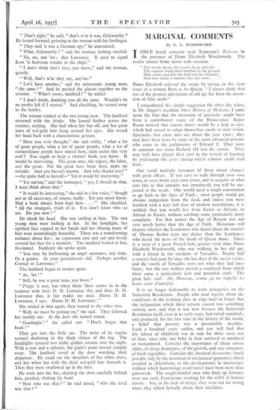MARGINAL COMMENTS
By E. L. WOODWARD
IONCE heard someone read Tennyson's Tithonus in the presence of Dame Elizabeth Wordsworth. The reader almost broke down with emotion.
" The woods decay, the woods decay and fall, The vapours weep their burthen to the ground, Man comes and tills the field and lies beneath, And after many a summer dies the swan . . . "
Dame Elizabeth relieved the strain by saying, in the clear tones of a woman Born to be Queen, " I always think that one of the greatest alleviations of old age has been the inven- tion of false teeth."
I remembered this simple suggestion the other day when, in Dr. Singer's excellent Short History of Medicine, I came upon the hint that the invention of spectacles might have been a contributory cause of the Renaissance. Roger Bacon noticed that convex lenses would be a help to eyes which had ceased to adapt themselves easily to near vision. Spectacles first came into use about the year 13oo ; they may have been worn by some of the more advanced persons who came to the parliaments of Edward I. They were in common use when Richard III lost his crown. They may well have played their part in the revival of learning by prolonging the years during which scholars could read texts.
One could multiply instances of these minor changes with great effects. If you care to walk through your own town, or even down your own street, and to enquire at what date this or that amenity was introduced, you will be sur- prised at the result. One would need a tough constitution to go back to the Ages of Faith ; most people would get chronic indigestion from the food, and unless you were fortified with a very full dose of modern inoculations, it is unlikely that you would live from Easter to Advent, or Advent to Easter, without catching some particularly nasty complaint. For that matter the Age of Reason was not very much better than the Age of Faith. Historians still dispute whether the Londoners who heard about the murder of Thomas Becket were any dirtier than the Londoners who heard the news of the death of Queen Anne. There is a story of a great French lady, greater even than Dame Elizabeth Wordsworth, who was walking, in her old age, with a friend in the outskirts of Versailles. Nearly half a century had gone by since the last days of the ancien regime, and the smells of Versailles were not what they had once been ; but the two walkers passed a courtyard from which there came a particularly rich and powerful stink. The great lady said : Ah, Monsieur, comme fa me rappelle les beaux fours d'autrefois.
It is no longer fashionable to write panegyrics on the Industrial Revolution. People who read reports about the conditions of the working class in 1842 tend to forget that the indignation which these reports caused was something entirely new, and that it was new because the Industrial Revolution itself, even in its early stage, had raised standards, and produced, for the first time in the history of the world, a belief that poverty was a preventable accident. Look a hundred years earlier, and you will find that the labour of childbirth was in vain for three cases out of four, since only one baby in four survived to manhood or womanhood. Consider the importance of cheap cotton shirts, of cheap drainpipes, of the growth, and easy transport, of fresh vegetables. Consider the chemical discoveries (made possible only by the invention of mechanical apparatus) which resulted in chloroform, or the developments in microscopy without which bacteriology could never have been more than guesswork. The tough-minded men who built up fortunes were not early Franciscans working for the relitf of human misery ; but, in the luck of things, they were not far wrong when they talked lyrically about their machines.






















































 Previous page
Previous page